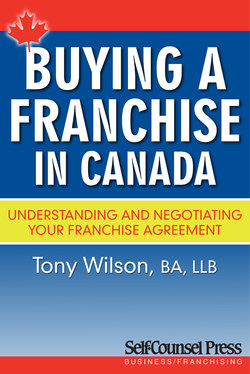Читать книгу Buying a Franchise in Canada - Tony Wilson - Страница 27
На сайте Литреса книга снята с продажи.
8. Does the Franchisor Own the Trade-marks?
ОглавлениеDoes the franchisor own the trade-marks? You can check this relatively easily by performing your own “bare bones” trade-mark search at the Canadian Trade-Marks Database, which is maintained by Strategis: http://strategis.ic.gc.ca/cipo/trademarks/ search/tmSearch.do. Or simply put CIPO into a search engine and it will direct you to the Canadian Intellectual Property Office, where you can find the trade-marks page. This website contains a lot of useful information on matters dealing with the federal government, but the most important matter here is that the site maintains a database for all registered, expunged, current, and pending Canadian trade-marks.
Enter the name of franchisor’s trade-mark in the search engine and assess from the results whether the mark has matured to registration or whether it has been applied for only (meaning the examiner at the trade-marks office is still assessing the trade-mark application and its potential for registration). You can also check if the mark has neither been applied for nor registered.
Note that Strategis Canadian Trade-Mark Database searches are not always foolproof or perfect. Garbage in will yield garbage out, so make sure you enter the trade-mark accurately. Also, the search engine has limitations, chiefly the fact that it finds “dead hits” but rarely does it find phonetic or visual equivalents (e.g., easy vs. EZ or Pharma vs. Farm).
If the mark has not matured to registration, meaning it does not have a registration number with initials (the initials are almost always TMA) immediately preceding the number, it is possible that the mark might not be approved or might be opposed by an interested third party (usually the owner of a similar mark). This might cause the franchisor to have to pick another mark and “re-brand” the franchise at some late (and more inconvenient) time. Re-branding can create confusion in the system and necessitate a change of signage, advertising, and other branding identifiers.
It is important to consider what will happen if the franchisor does not have a registered trade-mark at the time you acquire the franchise rights and if the franchisor might not ever be able to secure the trade-mark. It might be prevented from ever obtaining the trade-mark that you think you’re getting the right to use. The question to ask yourself is, “Is it worth all that money for this franchise if the franchisor can’t legally license me its trade-mark and brand?”
If you are still considering signing the agreement, then ask yourself this: “Who pays for re-branding if the mark, and all that goes along with it, has to change?”
In such cases, I like to have an agreement from the franchisor that if its trade-mark isn’t registered at the time the agreement is entered, then the franchisor is responsible for the costs of new signage and other display items arising from the need for this new mark. This could be done by way of an indemnity from the franchisor.
